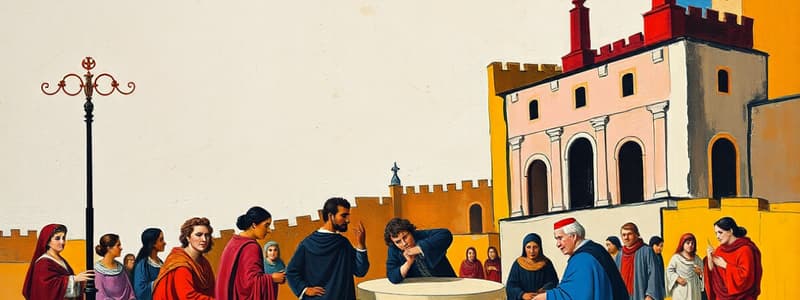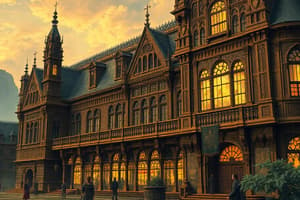Podcast
Questions and Answers
What was a significant outcome of the revival of Roman law during the Later Middle Ages?
What was a significant outcome of the revival of Roman law during the Later Middle Ages?
- Formation of a unified legal system known as the ius commune (correct)
- Creation of localized legal codes that rejected old laws
- Diminished role of universities in legal education
- Increased reliance solely on customary law without external influence
Which institution was crucial in the dissemination of Roman law during the Later Middle Ages?
Which institution was crucial in the dissemination of Roman law during the Later Middle Ages?
- The Church of England
- The University of Oxford
- The Bologna School of Law (correct)
- The Royal Courts of Justice
How did canon law influence the development of the ius commune?
How did canon law influence the development of the ius commune?
- It isolated secular law from religious contexts.
- It was absorbed entirely by Roman law.
- It led to the rejection of Roman legal texts.
- It addressed moral and ecclesiastical issues alongside Roman law. (correct)
What role did jurists play in the emergence of the ius commune?
What role did jurists play in the emergence of the ius commune?
What did the ius commune serve as in the context of European legal systems?
What did the ius commune serve as in the context of European legal systems?
What impact did the emergence of the ius commune have on local laws?
What impact did the emergence of the ius commune have on local laws?
Which legal text was central to the revival of Roman law during the Later Middle Ages?
Which legal text was central to the revival of Roman law during the Later Middle Ages?
What dual focus did jurists and judges have during the establishment of the ius commune?
What dual focus did jurists and judges have during the establishment of the ius commune?
Flashcards
Ius Commune (Common Law)
Ius Commune (Common Law)
A unified legal system that emerged in Europe during the Middle Ages, blending Roman and canon law.
Justinian's Corpus Iuris Civilis
Justinian's Corpus Iuris Civilis
A collection of Roman law texts compiled by Emperor Justinian, rediscovered and adapted in the Middle Ages.
Canon Law
Canon Law
The Church's legal system, addressing issues such as marriage, morality, and religious governance.
Universities and Legal Education
Universities and Legal Education
Signup and view all the flashcards
Civilians (Roman Law Scholars)
Civilians (Roman Law Scholars)
Signup and view all the flashcards
Canonists (Canon Law Scholars)
Canonists (Canon Law Scholars)
Signup and view all the flashcards
Glosses and Commentaries
Glosses and Commentaries
Signup and view all the flashcards
Impact on Local Laws
Impact on Local Laws
Signup and view all the flashcards
Study Notes
The Ius Commune: A Shared European Legal Framework
- The 12th-15th centuries saw a crucial shift in European law with the revival of Roman law and its amalgamation with canon law, forming the ius commune.
- This common legal system transcended local customs, laying a foundation for future European legal unity.
- Universities, especially in Bologna and Paris, became pivotal in educating jurists who disseminated and shaped this legal framework.
Rediscovery and Integration of Roman and Canon Law
- The 11th century rediscovery of Justinian's Corpus Iuris Civilis – a key Roman legal text – reintroduced sophisticated legal ideas to Europe.
- Scholars then studied and adapted these ancient laws to medieval circumstances.
- Canon law, the Church's legal system, addressed matters like marriage, morality, and church governance; concurrently developing alongside Roman law.
- The merging of Roman and canon law formed the ius commune, harmonizing secular and religious legal authorities.
The Role of Universities and Jurists
- Universities, particularly Bologna and Paris, became specialized centers for legal study, producing and training jurists.
- Legal scholars detailed glosses and commentaries on Roman texts, enhancing understanding and application.
- Jurists played a crucial role in formalizing the ius commune through legal opinions and training judges.
- Judges utilized Roman and canon law to resolve disputes, thereby creating a more standardized legal approach.
Impact on Local Laws
- While local customs continued, the ius commune increasingly influenced them, offering a framework for resolving conflicts and filling in gaps in existing local systems.
- The ius commune became a common legal language in Europe, fostering legal coherence across the continent.
Key Figures and Texts
- Justinian's Corpus Iuris Civilis, a foundational Roman legal text, was central to this period.
- The Bologna School of Law was a leading center for Roman law study.
- Canonists and Civilians, legal scholars focused on canon and Roman law respectively, shaped the ius commune.
Studying That Suits You
Use AI to generate personalized quizzes and flashcards to suit your learning preferences.
Description
Explore the evolution of European law from the 12th to 15th centuries, focusing on the revival of Roman law and its integration with canon law. This quiz delves into how the ius commune emerged, shaping legal systems across Europe and influencing the education of jurists in prominent universities. Test your knowledge on this crucial period of legal history.




